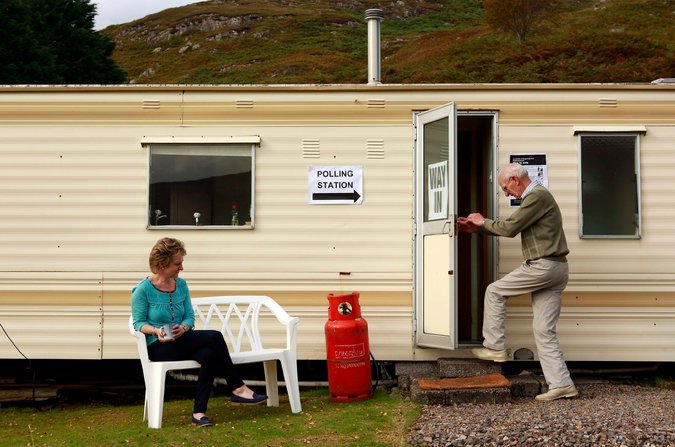
A poll clerk enters a caravan polling station in the Scottish Highlands on Thursday. Credit Cathal Mcnaughton/Reuters
Scotland’s Independence Vote Shows a Global Crisis of the Elites
The Upshot
When you get past the details of the Scottish independence referendum Thursday, there is a broader story underway, one that is also playing out in other advanced nations.
It is a crisis of the elites. Scotland’s push for independence is driven by a conviction — one not ungrounded in reality — that the British ruling class has blundered through the last couple of decades. The same discontent applies to varying degrees in the United States and, especially, the eurozone. It is, in many ways, a defining feature of our time.
The rise of Catalan would-be secessionists in Spain, the rise of parties of the far right in European countries as diverse as Greece and Sweden, and the Tea Party in the United States are all rooted in a sense that, having been granted vast control over the levers of power, the political elite across the advanced world have made a mess of things.
The details of Scotland’s grievances are almost the diametrical opposite of those of, say, the Tea Party or Swedish right-wingers. They want more social welfare spending rather than less, and have a strongly pro-green, antinuclear environmental streak. (Scotland’s threatened secession is less the equivalent of Texas pulling out of the United States, in that sense, than of Massachusetts or Oregon doing the same.) But there are always people who have disagreements with the direction of policy in their nation; the whole point of a state is to have an apparatus that channels disparate preferences into one sound set of policy choices.
What distinguishes the current moment is that discontent with the way things have been going is so high as to test many people’s tolerance for the governing institutions as they currently exist.
The details are, of course, different in each country.
In the case of Britain, a Labor government led by a Scottish prime minister (Gordon Brown) and his Scottish finance minister (Alistair Darling) supported the financialization of the British economy, with the rise of global mega-banks in an increasingly cosmopolitan London as the center of the economic strategy.
In the United States, we watched a bipartisan push toward financial deregulation in the 1990s and 2000s lay the groundwork for the 2008 crisis. The inability of the Bush or Obama administration to contain the damage (and indeed to fight it with financial bailouts) ushered in a Tea Party in 2010 elections that is beyond the control of elder statesmen of the Republican Party.

It is in continental Europe that the consequences of bungling by mainstream elites are perhaps the most damaging. The decades-long march toward a united continent, led by the parties of the center-right and center-left, created a Western Europe in which there was a single currency and monetary authority but without the political, fiscal and banking union that would make it possible for imbalances between those countries to work themselves out without the benefit of currency fluctuations. When it all came to a head from 2008 to 2012, national leaders were sufficiently alarmed by the risks of budget deficits that they responded by cutting spending and raising taxes.
As such, the imbalances that built up over the years in Europe are now working themselves out through astronomical unemployment and falling wages in countries including Spain and Greece. Even the northern European economies, including Germany, are experiencing little or no growth. As Paul Krugman noted this week, while the Great Depression of the 1930s was a sharper contraction in economic activity initially, the European economy is performing worse six years after the 2008 crisis than it was at the comparable point in the 1930s.
The details of the policy mistakes are different, as are the political movements that have arisen in protest. But together they are a reminder that no matter how entrenched our government institutions may seem, they rest on a bedrock assumption: that the leaders entrusted with power will deliver the goods.
Power is not a right; it is a responsibility. The choice that the Scots are making on Thursday is about whether the men and women who rule Britain messed things up so badly that they would rather go it alone. And so the results will ripple through world capitals from Athens to Washington: People don’t think the way things are going is good enough, and voters are getting angry enough to want to do something about it.